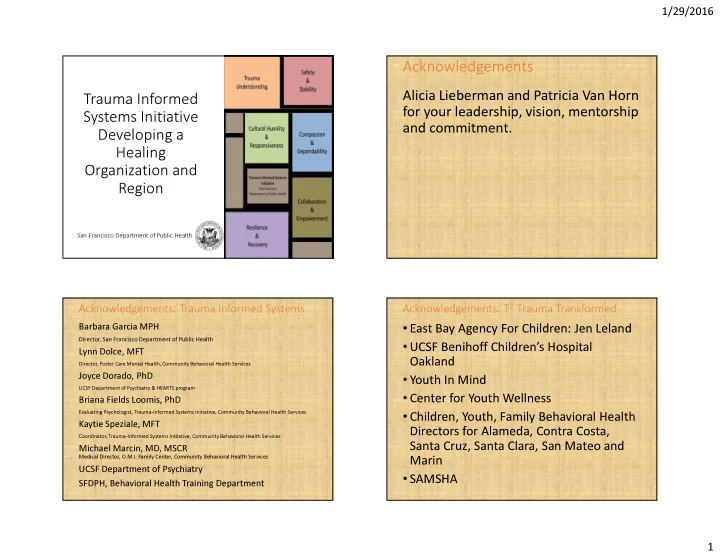

1/29/2016 Acknowledgements Alicia Lieberman and Patricia Van Horn Trauma Informed for your leadership, vision, mentorship Systems Initiative and commitment. Developing a Healing Organization and Region San Francisco Department ofPublic Health Acknowledgements: T 2 Trauma Transformed Acknowledgements: Trauma Informed Systems Barbara Garcia MPH • East Bay Agency For Children: Jen Leland Director, San Francisco Department of Public Health • UCSF Benihoff Children’s Hospital Lynn Dolce, MFT Oakland Director, Foster Care Mental Health, Community Behavioral Health Services Joyce Dorado, PhD • Youth In Mind UCSF Department of Psychiatry & HEARTS program • Center for Youth Wellness Briana Fields Loomis, PhD Evaluating Psychologist, Trauma-Informed Systems Initiative, Community Behavioral Health Services • Children, Youth, Family Behavioral Health Kaytie Speziale, MFT Directors for Alameda, Contra Costa, Coordinator, Trauma-Informed Systems Initiative, Community Behavioral Health Services Santa Cruz, Santa Clara, San Mateo and Michael Marcin, MD, MSCR Medical Director, O.M.I. Family Center, Community Behavioral Health Services Marin UCSF Department of Psychiatry • SAMSHA SFDPH, Behavioral Health Training Department 1
1/29/2016 Trauma Trauma Informed Trauma Trauma Informed Responsive? Systems? Informed? Practices? Trauma ACES? Informed ACES Communities? Connection? Secondary Trauma ? Adapted From CANarratives.org Relational Leadership “I've learned that people will forget what you said, people will forget what you did, but people will never forget how you made them feel.” Maya Angelou 2
1/29/2016 Health Disparities & Trauma Impact of Racism Health Outcomes Coping Stress Health Greater Risk & Trauma Cultural Morbidity Historical Trauma Historical Buffers Disenfranchised Unresolved Grief Identity Attitudes Grief Microaggressions Enculturation Spiritual Coping Traumatic Life AOD Use Resilience Events Abuse & Attachment Dependence Physical & Sexual Traditional Health Practices Mental Health Internalized Oppression PTSD Trauma Response Depression Anxiety Violence Organizational Homeostasis Trauma affects systems as well as individuals and communities 3
1/29/2016 Organizational Trauma A Trauma-Organized System Reliving/Retelling Increased Arousal/Reactivity Avoiding 13 A Healing Organization… “Trauma Informed Systems principles and practices support reflection in place of reaction, curiosity in lieu of numbing, self-care instead of self-sacrifice and collective impact rather than siloed structures.” From Epstein, K, Speziale, K., Gerber, E., & Loomis, B. (2014). Trauma informed systems initiative: 2014 year in review . Unpublished manuscript, San Francisco Department of Public Health, San Francisco, CA 4
1/29/2016 How do we build a trauma Trauma informed system? Understanding GOAL To align and Compassion & Safety & Through your voice LEADERSHI P Dependability Stability embed trauma & participation we: POLICY & informed PROCEDURES Implement a plan to principles into sustain Shift practice PRACTICE knowledge practices, and policies, and Use base to practices. programs to collaboratively Cultural Humility Build base of be trauma Collaboration & identify areas & Responsiveness common informed. Empowerment to improve. knowledge Resilience & and shared Recovery language. 18 Teach Approach Workforce Training • System-wide Training Study • Creating a foundational understanding and shared Train the language Evaluation Trainer • Supplying the workforce with tools to try out • A cultural change built on an understanding of relationships PRACTICE • A trauma-informed lens is a racially and culturally- Sustain informed lens Support Alignment Champions • Race, Culture & Health Disparities Two Lenses • Leadership Workforce Development 5
1/29/2016 SFDPH Trauma Informed System Evaluation • Are we improving our System system? • Client satisfaction, staff Impacts engagement, etc. • Are we creating change? Practice • Individual and program Change commitments to change • Are we supporting Knowledge learning? • Trauma 101 training Change evaluations Implementation Science 6
1/29/2016 Building a Trauma Informed Region Trauma Informed Agency Assessment (TIAA) • The TIAA is a validated data collected tool designed by family, youth and agency staff to be used in THRIVE, Maine’s Trauma Informed System of Care • Selected as a readiness assessment for the Bay Area regional trauma informed system of care expansion • The TIAA is designed to identify areas of strength and areas for improving trauma informed care. P F R U E T S U E R N E T 7
Recommend
More recommend